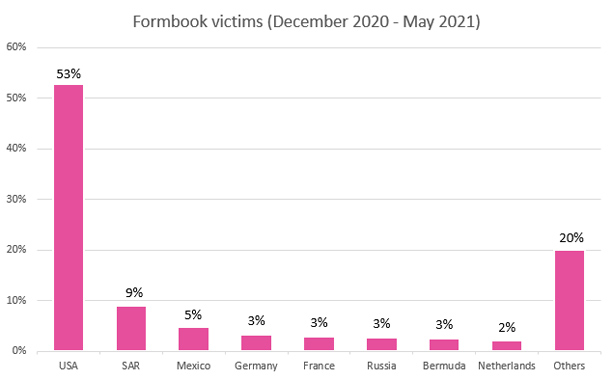Hackers in 69 countries have made requests for the evolved malware
MAC users better be extra careful as Check Point Research (CPR) sees a new strain of malware that has evolved to steal the information of MacOS users. Named “XLoader”, the new strain is a derivative of the famous “Formbook” malware family, which mainly targeted Windows users, but disappeared from being on sale in 2018. Formbook rebranded to XLoader in 2020. Over the past six months, CPR studied XLoader’s activities, learning that XLoader is prolific, targeting not just Windows, but to CPR’s surprise, Mac users as well.
Hackers can buy XLoader licenses on the Darknet for as low as $49, equipping them with capabilities to harvest log-in credentials, collect screenshots, log keystrokes, and execute malicious files. Victims are tricked into downloading XLoader via spoofed emails that contain malicious Microsoft Office documents.
This is a potential threat to all Mac users. In 2018, Apple estimated that over 100M Macs were in use.
Victims
CPR tracked Xloader activity between December 1, 2020 and June 1, 2021. CPR saw XLoader requests from as many as 69 countries. Over half (53%) of the victims reside in the United States. The breakdown of victims by country is presented in the bar graph below:

Infection Process
XLoader is usually spread by spoofed emails that lure their victims into downloading and opening a malicious file, usually Microsoft Office documents.
Prevention Tips
To avoid infection, CPR recommends both Mac and Windows users to:
- Not open suspicious attachments
- Avoid visiting suspicious websites
- Use 3rd party protection software to help identify and prevent malicious behavior on their computer
Detection and Removal Guidance
Since this malware is stealth in nature, it is likely difficult for a “non-technical” eye to recognize whether they have been infected. Therefore, if you suspect you have been infected it would be wise to consult with a security professional or use third party tools and protections designed to identify, block and even remove this threat from your computer. For more technical details to assist, CPR recommends going to Autorun and:
- Check your username in the OS
- Go to /Users/[username]/Library/LaunchAgents directory
- Check for suspicious filenames in this directory (example below is a random name) /Users/user/Library/LaunchAgents/com.wznlVRt83Jsd.HPyT0b4Hwxh.plist
- Remove the suspicious file
Yaniv Balmas, Head of Cyber Research at Check Point Software, said: “As part of our cybercrime tracking, we have observed interesting developments by the well-known malware family ‘Formbook’. We see a new strain of malware derived from the original Formbook malware. Named ‘XLoader’, this malware is far more mature and sophisticated than its predecessors, supporting different operating systems, specifically MacOS computers. Historically, MacOS malware hasn’t been that common. They usually fall into the category of ‘spyware’, not causing too much damage. I think there is a common incorrect belief with MacOS users that Apple platforms are more secure than other more widely used platforms. While there might be a gap between Windows and MacOS malware, the gap is slowly closing over time. The truth is that MacOS malware is becoming bigger and more dangerous. Our recent findings are a perfect example and confirm this growing trend. With the increasing popularity of MacOS platforms, it makes sense for cyber criminals to show more interest in this domain, and I personally anticipate seeing more cyber threats following the Formbook malware family. I would think twice before opening up any attachments from emails I get from senders I don’t know.”


